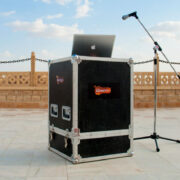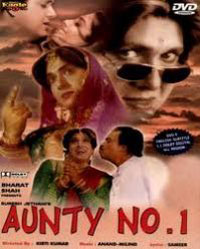India has never been short of comedy. Whether it is the humour of Johnny Lever or Jaspal Bhatti, we’ve all had our share of laughs. On the other hand, India had also probably never seen comedy outside of the reel world for a long time. But now things are changing. Laughter is a serious business and stand-up comedy a serious affair.
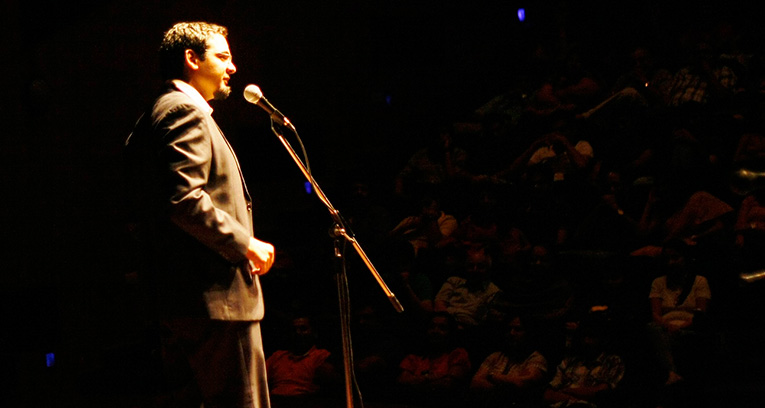
Raghav Mandava performing at the Epicenter, Gurgaon. Photograph by Malini Mago.
It’s mid-week madness in a small diner in New Delhi, a motley crowd of 40 bursts into laughter as stand-up comedian Abish Mathew says: “When a bag or a marriage gets old, the first things to get affected are the… zips”. A comedian for over two years now, Mathew feels that stand-up comedy in Delhi has picked up in a big way, but only very recently. “There was barely anything for comedy happening back when I started in 2009. But then international comedian Papa CJ introduced the Shaken & Stirred series which really stirred things up and kick started the open mic platforms. Soon after, we saw the formation of Cheese Monkey Mafia, the Delhi-based events company that was started as an initiative by (fellow comedian) Raghav Mandava to organise comedy events across the capital and then came other similar platforms like Rajneesh Comedy Challenge and it all set the ball rolling.”
What is the cause for this sudden rise in popularity for stand-up comedy in India? Many attribute its popularity to T.V. shows like The Great Indian Laughter Challenge and its byproducts like Raju Srivastav. However, unlike stand-up comedy, these comedy shows provide slapstick and in-your-face jokes. “Stand-up comedy is a relatively new concept in our country but unlike the T.V. shows which are mostly just about the jokes, a stand-up comedian is under pressure to make you laugh every 30 seconds, which is approximately 120 to 150 times in an hour. So, obviously the returns are much greater than any comedy-based reality T.V. show,” explains Mandava.
Simply put, humour connects everyone. Life is fast and everyone wants a one-hour massage in 10 minutes. However, I think that it’s got a lot to do with the old cliché about laughter being the best medicine. Having attended various comedy events across town in the past two years, I have come to realise how true that is. Comedy is the perfect way to get rid of those tensions and worries. For some of us, it’s a way to forget about sadness and illness for a while. A chance to just feel good, even if it’s at the expense of the comedian!
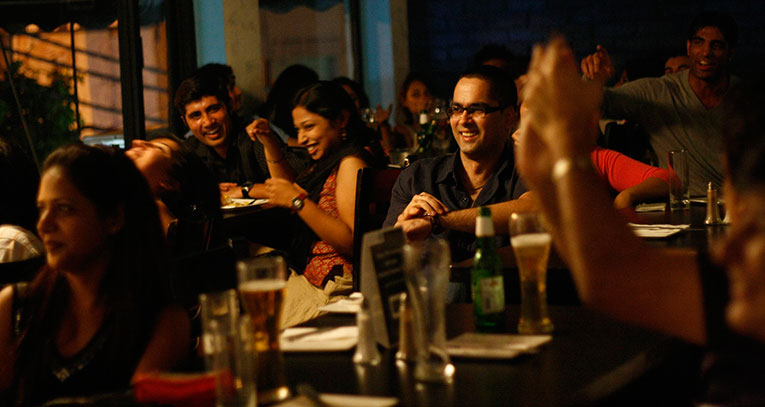
People in the audience enjoying themselves at a stand-up comedy performance at the International Diner, New Delhi. Photograph by Malini Mago.
Comedy has to have a tinge of pain, wit and wisdom underlying the humour to last long in the minds of the people, and as Jerry Lewis once famously said, “The premise of all comedy is a man in trouble.” Ask any comedian and they would absolutely swear by it. For instance, Mathew believes that his material is mostly self-derogatory and inspired by a satirical take on family, while Mandava believes that as a comedian you have to be able to poke fun at yourself. “You can’t do that if you have had an easy life,” he says, “In other words, your comedy is in your tragedy.” It’s safe to say that in the business of comedy, one has to constantly pick human quirks because that’s what people relate to. It requires an ability to look at oneself from the eyes of a sociologist, but present it like a clown to make it universally humorous.
But that’s not all. The task of being funny is rather daunting for a comedian, as a comic presentation is doomed with a limited shelf-life. For example, Britney Spears could perform ‘Hit Me Baby, One More Time’ a million times and still have the audience crying for more but if a comedian is found repeating his material too often, there just might be trouble in paradise. According to Mathew, “The pressure keeps building with every performance, not just because of your audience, but also because you want to improve, get bigger laughs, and a louder applause.” Sayak Basu, a Delhi-based stand-up comedian who daylights as a copywriter, feels, “Unlike music, usually our audience comes back to hear us talk about new topics, they want us to entertain them by being equally amusing and fresh each time. Even when I repeat jokes, I try to add a new punch to it, deliver it a little differently, study the audience a little bit. We definitely change our material during bigger shows, but open mics are the best places to practise, repeat, and try out old/new jokes.”
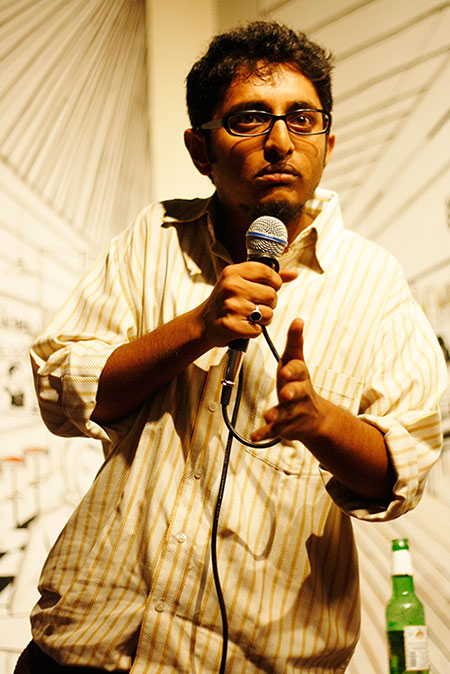
Sayak Basu is a Delhi-based stand-up comedian who daylights as a copywriter. Photograph by Malini Mago.
Opportunities are provided in plenty by Raghav Mandava’s Cheese Monkey Mafia open mic nights. Formed in 2010, this Delhi-based events company organises at least two open mic nights every month where performers both amateur and professional are given a platform to strut their stuff. “What Cheese Monkey Mafia has done for comedians and other such performers is given them an impetus for growth,” says Mandava. Since then, there has been no looking back for the city considered as one with no sense of humour. A whopping seven to eight open mic nights mushrooming in the circuit such as the Rajneesh Comedy Challenge, Krack U Up Nights, and Loony Goons should be reason enough to change your mind. “If it weren’t for the open mic nights, I would still be standing in front of the bathroom mirror imitating Russell Peters and Danny Bhoy. They are like net practice, it’s our field where we can run in any direction we want in order to test new material,” says Basu. Ask if these small-scale shows are the right way to go and Abish is quick to respond, “Oh, yes, with a growing economy like ours, performance opportunities are ever-growing but as a stand-up comedian one needs to progress and improve, so the open mic circuit is the best way to do it! Eventually the paid shows will also come around.”
The large number of shows, platforms, and opportunities that have opened their doors to performers across the city have also solved the problem of sponsorship. Most comedians complain that prospective sponsors sit up and take notice of you only after you’ve become an established name. Therefore, the more one performs, the more they get noticed and eventually the big guns fire up. Case in point, shows like Abish and Friends and A Night with Cheese Monkey Mafia. Having tasted the sweet success of a house-full show with an auditorium filled with 300 people and more waiting to get in; both Mandava and Mathew feel that the perception of stand-up comedy has definitely changed. “In these two years, stand-up comedy has grown so much that even respected venues like India Habitat Center and Epicenter have opened their doors to comedy specials like the Jaat In Mood, End the Occupation, A Night with Cheese Monkey Mafia, and Abish and Friends. And now it has taken the leap to the corporate gigs,” says Mathew. A line-up of five corporate shows in less than a month, including outstation performances for Raghav Mandava, speaks leaps and bounds about the growth of comedy.
Though one might feel that one’s comedy is in one’s tragedy, there’s a world of difference. When doing tragedy, a moment seems eternal but in comedy, eternity is a moment. If you miss the point, you have lost the result. There is the added pressure of keeping the audience glued in at all times. However, it doesn’t deter the comedians any longer as they feel that audiences have matured over time and tastes have changed. “It’s great to see the way the audience is opening their minds for so many different views by the various comics. The struggle to keep an audience cackling is a lovely experience,” says Basu. Needless to say, though, the Indian audience can be rather volatile to comedy. Comedy can be serious business and especially because people pay good money to come and laugh. They can be brutal if they don’t like you and can write you off very easily. However, if they do like you then they literally take ownership of the performer and that is a high about which one must ask every comedian after a successful show.
I know why I attend stand-up comedy nights, love watching Conan O’Brien, and laugh my head off to Chris Rock’s stand-up. I know it makes me happy and—at the risk of sounding clichéd—for a while it really does open up the lighter side of life. Like Raghav Mandava says, “Stand-up comedy has the ability to take you to a place you’ve never been before, in a way you’ve never tried before.” Good thing is, it has made its in place in India and is going to stay.





